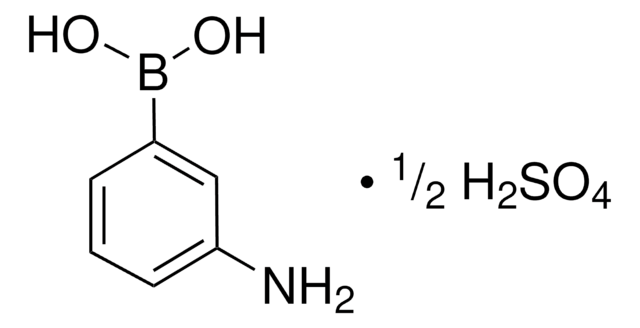SAE0003
4-Hydroxyphenylpyruvate Dioxygenase from Streptomyces avermitilis
recombinant, expressed in E. coli
Iniciar sesiónpara Ver la Fijación de precios por contrato y de la organización
About This Item
Productos recomendados
recombinant
expressed in E. coli
form
liquid
specific activity
≥5 U/mg
mol wt
~41.8 kDa
shipped in
dry ice
storage temp.
−70°C
General description
4-Hydroxyphenylpyruvate Dioxygenase (4-HPPD) is a key enzyme in the catabolism of tyrosine and phenylalanine. 4-HPPD catalyzes the synthesis of homogenistate (2,5-dihydroxyphenylacetate) from ρ-hydroxyphenylpyruvate and molecular oxygen. 4-HPPD also catalyzes the conversion of α-ketoisocaproate to Β-hydroxyisovalerate. 4-HPPD requires Fe2+ as an essential cofactor.
Rat 4-HPPD has a minimum of 80% homology with human 4-HPPD. Rat 4-HPPD is expressed abundantly in hepatocytes. It is also expressed in kidney, particularly in epithelial cells of the proximal tubules and the distant tubules. 4-HPPD has been identified as a potential biomarker of drug-induced liver injury in rat studies.
Rat 4-HPPD has a minimum of 80% homology with human 4-HPPD. Rat 4-HPPD is expressed abundantly in hepatocytes. It is also expressed in kidney, particularly in epithelial cells of the proximal tubules and the distant tubules. 4-HPPD has been identified as a potential biomarker of drug-induced liver injury in rat studies.
Unit Definition
One unit will oxidize 1 μmole of molecular oxygen per minute at pH 7.0, 25 °C, in the presence of 4-hydroxyphenylpyruvate.
Storage Class
10 - Combustible liquids
wgk_germany
WGK 1
flash_point_f
Not applicable
flash_point_c
Not applicable
Certificados de análisis (COA)
Busque Certificados de análisis (COA) introduciendo el número de lote del producto. Los números de lote se encuentran en la etiqueta del producto después de las palabras «Lot» o «Batch»
¿Ya tiene este producto?
Encuentre la documentación para los productos que ha comprado recientemente en la Biblioteca de documentos.
Nuestro equipo de científicos tiene experiencia en todas las áreas de investigación: Ciencias de la vida, Ciencia de los materiales, Síntesis química, Cromatografía, Analítica y muchas otras.
Póngase en contacto con el Servicio técnico








